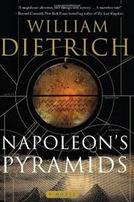
This is one of those book encounters where you see a novel (and an author’s name) for the first time at Barnes & Noble, and it catches your eye. The graphics of the hard back sleeve compelled me to check it out, then the description of the story pushed me on to purchase. There you have it: a classic case of judging a book by its cover. The subject matter of the Napoleon’s Pyramids struck a chord for me since it dealt with subject matter I’m interested in, and the time and place of the story preceded and slightly overlapped the setting of my second book Sub Rosa – The Lost Formula. Napoleon’s Pyramids takes place about sixteen years earlier than my novel, and I was interested to see how the author treated the time, the genre and the elements of the story. I wasn’t disappointed, but I was a little surprised.
I thought the cover graphics spoke more of a serious-toned historical thriller, with a hint of an esoteric theme, but the read ended up being a bit irreverent and wise-cracking. Written from the first person perspective, Napoleon’s Pyramids follows the adventures of Ethan Gage, Ben Franklin’s assistant at one time, an expatriate American adventurer, and a man on the run. He must scramble out of Paris, with the local gendarmerie in pursuit, and finds himself on his way to join Napoleon’s army on the Egyptian campaign. Gage is something of an impertinent bad boy of an adventurer, a gambler and womanizer, who loves to see what’s over the next hill. And it’s the result of one of his gambling wins that sent him hurtling out of the city to see what fate might offer him next. His prize from the gambling table, however, is a mysterious ancient artifact (pictured on the cover) which others seek zealously and ruthlessly, and the relic ties directly into an esoteric secret whose key is in Egypt, the very place Gage is headed.
I enjoyed the read, and came to appreciate Gage’s cheeky style in the midst of a fast-moving historical thriller with supernatural touches. Think Indiana Jones meets Napoleon. William Dietrich, a Pulitzer Prize-winning journalist, historian and naturalist had written five novels before this, as well as three non-fiction titles. Following Napoleon’s Pyramids, the first of the Ethan Gage novels, Dietrich went on to write six more at the time of this writing (The Rosetta Key, The Dakota Cipher, The Barbary Pirates, The Emerald Storm and Three Emperors). I’ve read the first four. I recommend this book as a light, quick read that provides interesting historical insights. It’s a fast-paced entertaining tale. The Rosetta Key, the following episode in the Gage series, is equally satisfying.
I thought the cover graphics spoke more of a serious-toned historical thriller, with a hint of an esoteric theme, but the read ended up being a bit irreverent and wise-cracking. Written from the first person perspective, Napoleon’s Pyramids follows the adventures of Ethan Gage, Ben Franklin’s assistant at one time, an expatriate American adventurer, and a man on the run. He must scramble out of Paris, with the local gendarmerie in pursuit, and finds himself on his way to join Napoleon’s army on the Egyptian campaign. Gage is something of an impertinent bad boy of an adventurer, a gambler and womanizer, who loves to see what’s over the next hill. And it’s the result of one of his gambling wins that sent him hurtling out of the city to see what fate might offer him next. His prize from the gambling table, however, is a mysterious ancient artifact (pictured on the cover) which others seek zealously and ruthlessly, and the relic ties directly into an esoteric secret whose key is in Egypt, the very place Gage is headed.
I enjoyed the read, and came to appreciate Gage’s cheeky style in the midst of a fast-moving historical thriller with supernatural touches. Think Indiana Jones meets Napoleon. William Dietrich, a Pulitzer Prize-winning journalist, historian and naturalist had written five novels before this, as well as three non-fiction titles. Following Napoleon’s Pyramids, the first of the Ethan Gage novels, Dietrich went on to write six more at the time of this writing (The Rosetta Key, The Dakota Cipher, The Barbary Pirates, The Emerald Storm and Three Emperors). I’ve read the first four. I recommend this book as a light, quick read that provides interesting historical insights. It’s a fast-paced entertaining tale. The Rosetta Key, the following episode in the Gage series, is equally satisfying.
 RSS Feed
RSS Feed
